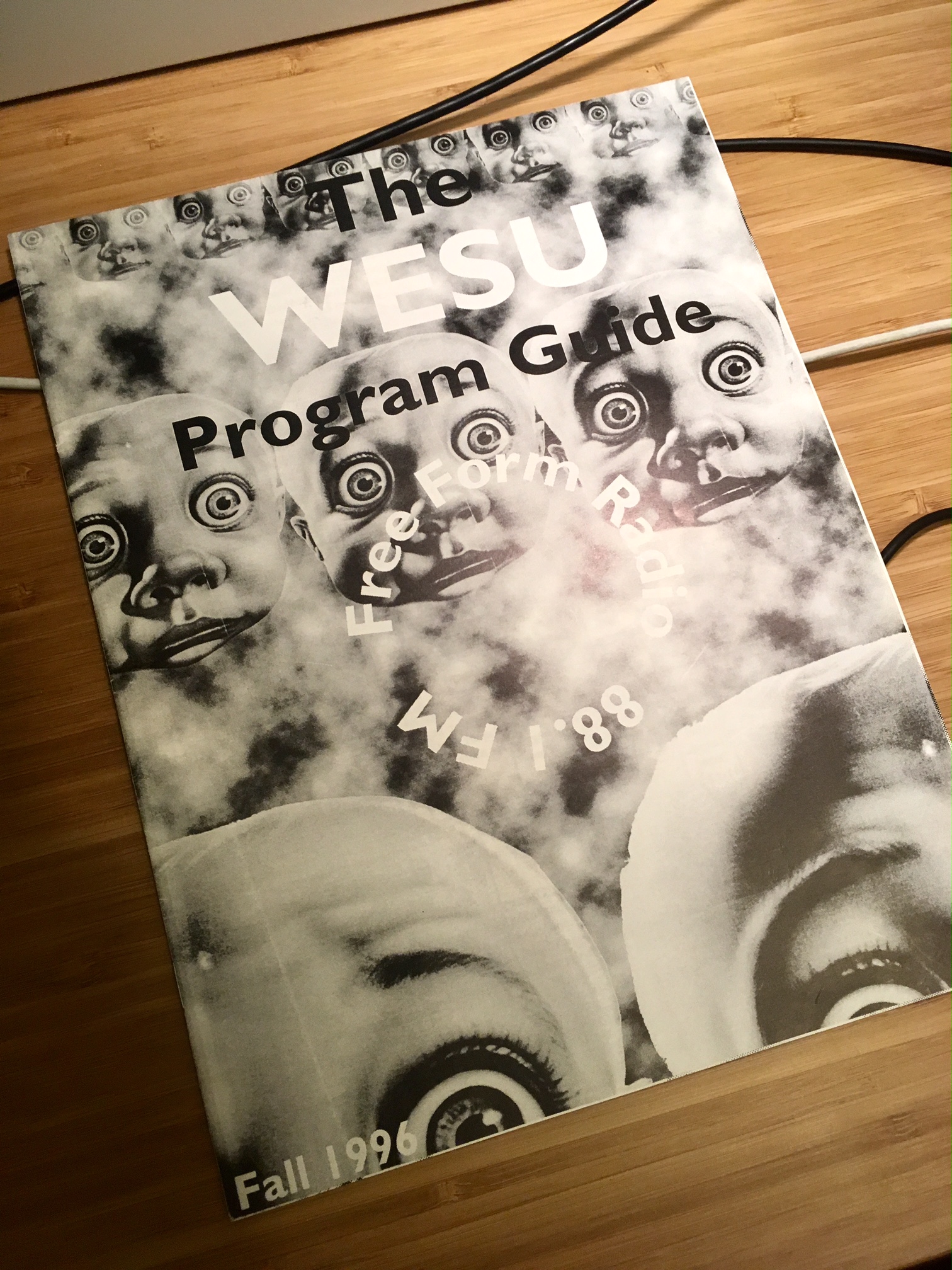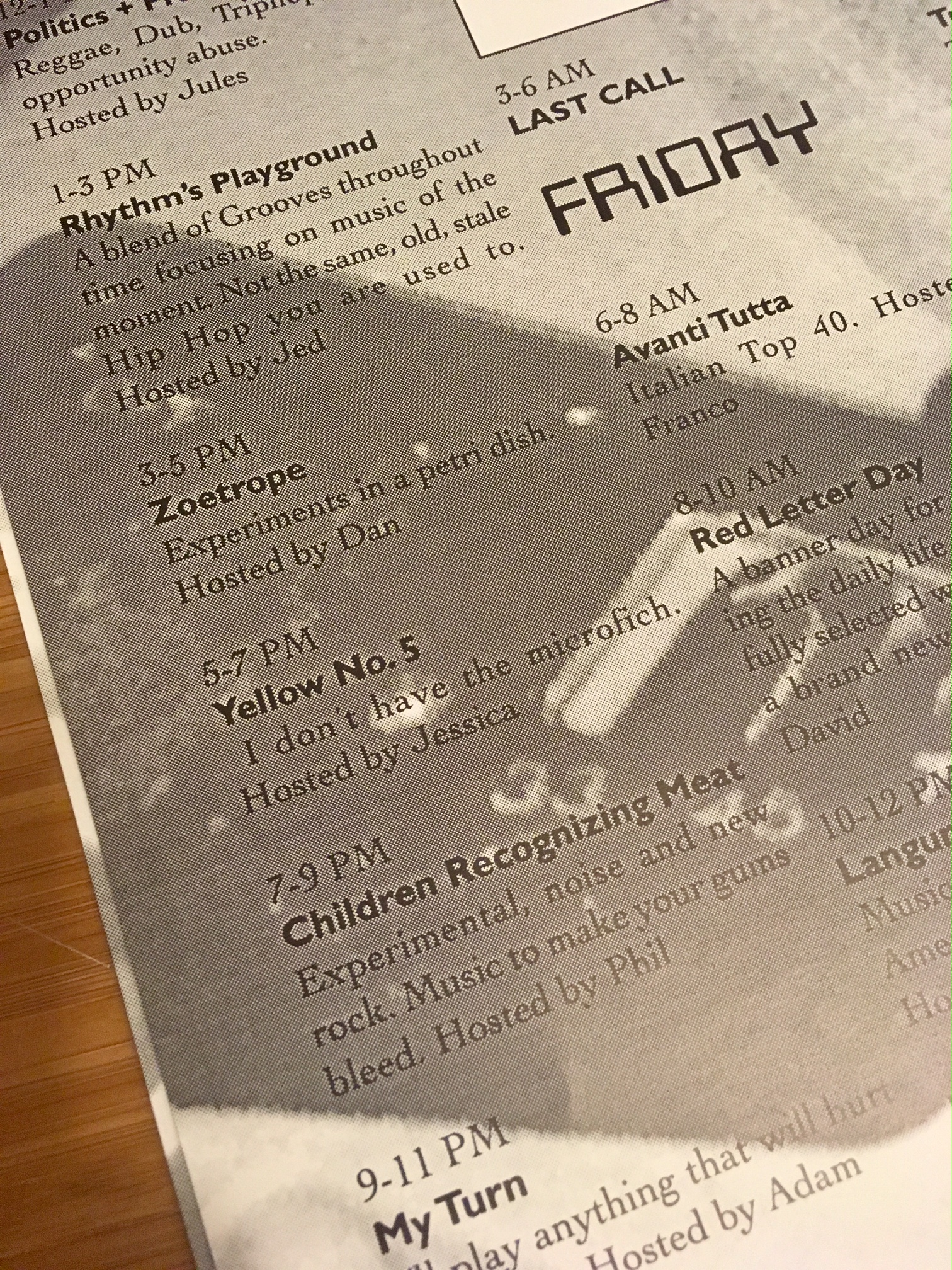Yellow No. 5: A College Radio Love Story
Of course I clicked on this link: Fuck Algorithms, College Radio Is a Reminder of How Great Music Can Be When Nobody's Trying to Make Money
My time on the airwaves of 88.1 FM WESU Middletown not only cemented my love of freeform broadcasting, weird, late night radio shows, and avant-garde music; it also launched my career. I can trace a direct line from WESU to my current job as an audio mastering and restoration engineer and audio archivist.
I called my radio show Yellow No. 5, and I took the Thursday drive time 5-7pm slot on 88.1 FM WESU, Wesleyan University's low power freeform radio station. My time slot (and show name) shifted over my three years on the air at WESU, and my playlists evolved and diversified. I even started a radio journalism class my senior year that used a Stereolab song as its intro theme.
WESU was located in the basement of Clark Hall. It was dirty, rundown and filled with energy. Our board was so old, the potentiometers were knobs, not the more familiar sliders. The stacks held records and CDs in equal number, though the new releases were mostly on CD.
This was the mid-90s, before podcasts, streaming, Napster, Shazaam, ProTools, iPhones. If I wanted to discover new music, I had to pull records or CDs off the shelf and queue them up, or browse record stores and flea markets, gambling on purchases based on record label, associated personnel, cover art, or get word-of-mouth recommendations from fellow DJs and crate diggers. I stumbled upon - and fell in love with - Paul de Marinis and Cornelius Cardew recordings from a compilation put out by the Leonardo Music Journal, published by MIT Press. I coveted my Maggi Payne and "Blue" Gene Tyranny 7-inches from a collection put out by Lovely Records. (In fact, "Blue" Gene Tyranny's Out of the Blue was the first LP I ever bought online!) The music directors at WESU led me to Momus, the Divine Comedy, Blonde Redhead, Melt Banana, and everything John Zorn was releasing on Tzadik. My boyfriend at the time turned me on to Alvin Lucier and Sonic Youth. That same boyfriend had a radio show too, and he liked to mix ambient records with spoken word, found sounds, field recordings and other random things. Another DJ referred to it as "aural laxative;" the sounds of his radio show made her want to shit. This is college radio.
When I wanted to make an on-air promo cart, I recorded it onto a literal cart(ridge), making crude but creative cuts with a razor blade on 1/4" analog tape in order to mix down the dialog, music and sound effects. (Later, at WGBH in Boston, all interstitial promos were stored digitally but deployed using a faux "cart" graphic display on the computer.)
College radio was live and amateurish, and the DJs were ambitious and passionate, if not necessarily destined for careers in broadcasting. There was dead air. There were awkward transitions, miscued records, accidental f-bombs, but it was all ethereal. Mistakes vanished. DJs pulled out of nose dives and recovered to spin again. Contrast that with podcasting, which is planned, pre-recorded and permanent, and thus lacks the danger of being live and on the air. College radio is a tightrope without a net. If you fuck up, you don't get a redo, you simply keep talking or press play. Maybe no one's listening. But potentially, you're reaching one, or many, and potentially, you can make a connection, convince someone that they should love a song you love, that, by putting things in the right musical context, you are creating new meaning. You're communicating.
A DJ in the weeds is exciting and engaging. You might root for her as she drops CD cases on the floor, presses play on the wrong deck, shuffles papers around trying to find something articulate to say; or you might give up and spin the dial, but at least you know she is real. A lousy podcast is just lazy, and because it's recorded and exists in the digital realm, it's laziness is fixed. A fuck-up on a podcast will haunt you again and again.
My first job straight out of college was on the air at WGBH 89.7 FM, one of Boston public radio stations. Ask me about it. I can still repeat the call sign, the local weather, a grantor credit and forward promote the next show in a perfect 30 second window. My potential audience at WGBH was much larger, but I was still just a voice in the night, reminding you that the music you were listening to was made possible by your annual membership support. I was on the air for around three years before I discovered the brick wall that is public radio on-air talent. I was never going to get my own show. I moved into production, realized I loved manipulating audio, moved to New York City to go back to school, and found mastering.
I haven't been on the air in over a decade, and I still - still! - have radio anxiety dreams. The music library is locked and I don't have enough records to play! I can't find my copy and I have nothing to say! There is a hamburger on the turntable, and the stylus is digging into the sesame seed bun!
See, there was something about being live, on the air, that infused what I was doing with potentiality and meaning. There was chance. Maybe someone would listen and connect, maybe not. Maybe I would put together a series of songs that were greater than the sum of their parts. Maybe I'd put on some crazy noisy shit and everyone would spin the dial on up to the classic rock and lite FM stations. The point is, I couldn't know. There were no listener's statistics, likes, shares or download data. In fact, the only way I'd know if anyone was listening was if someone called in a request, which didn't happen that often. College radio was an unknowable risk, which enabled us DJs to push the envelope, push ourselves.
Once, I decided to do a Valentine's Day Love Phones knock-off All-Request show, but, instead of requesting, like, Seal and Jewel songs, I'd play Merzbow for your loved one. I was serving a niche audience. I might have a cassette of that broadcast in a box somewhere, negating my earlier point that the beauty and joy of college radio is that it is impermanent and ephemeral. Then again, I'm an audio archivist and have not digitized my own old radio show cassettes, so maybe it is.



